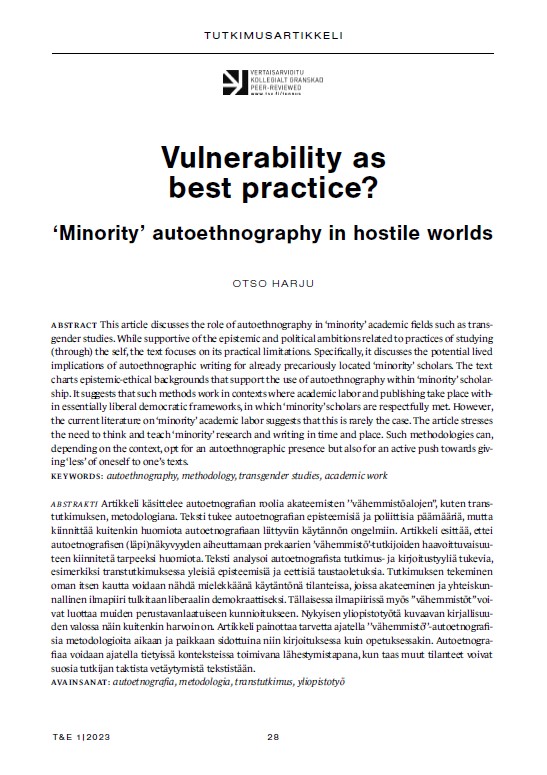Vulnerability as best practice?
‘Minority’ autoethnography in hostile worlds.
DOI:
https://doi.org/10.51809/te.126090Avainsanat:
autoethnography, transgender studies, methodology, research ethicsAbstrakti
This article discusses the role of autoethnography in ‘minority’ academic fields such as transgender studies. While supportive of the epistemic and political ambitions related to practices of studying (through) the self, the text focuses on its practical limitations. Specifically, it discusses the potential lived implications of autoethnographic writing for already precariously located ‘minority’ scholars.
The text charts epistemic-ethical backgrounds that support the use of autoethnography within ‘minority’ scholarship. It suggests that such methods work in contexts where academic labor and publishing take place within essentially liberal democratic frameworks, in which ‘minority’ scholars are respectfully met. However, the current literature on ‘minority’ academic labor suggests that this is rarely the case.
The article stresses the need to think and teach ‘minority’ research and writing in time and place. Such methodologies can, depending on the context, opt for an autoethnographic presence but also for an active push towards giving ‘less’ of oneself to one’s texts.


Tiedostolataukset
Julkaistu
Viittaaminen
Numero
Osasto
Lisenssi
Copyright (c) 2023 Otso HarjuVuodesta 2021 eteenpäin
Tiede & edistyksen sisällöt on numerosta 1-2 / 2021 eteenpäin julkaistu lisenssillä:
Creative Commons Nimeä-EiKaupallinen-EiMuutoksia 4.0 Kansainvälinen (CC BY-NC-ND 4.0).
Tutustu lisenssin ehtoihin täällä. Tekijänoikeudet säilyvät tekijällä.
* * *
Vuodet 1976-2020
Tiede & edistyksen tekstit vuosilta 1976-2020 on uudelleenjulkaistu avoimesti seuraavin ehdoin:
Tekstit ja materiaalit ovat vapaasti luettavissa ja käytettävissä sellaisinaan. Tekijänoikeudet ja rinnakkaisjulkaisuoikeudet pysyvät tekijällä. Tekstien ja muun sisällön uudelleenjulkaisuun on pyydettävä lupa tekijältä.




